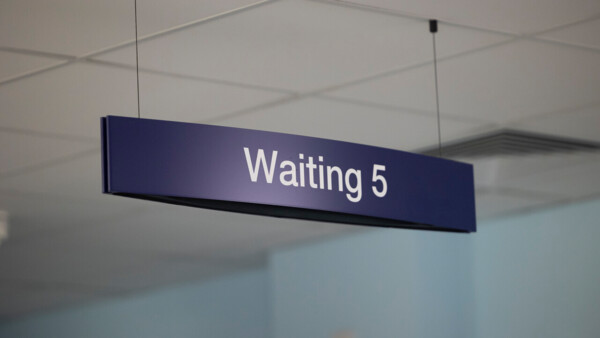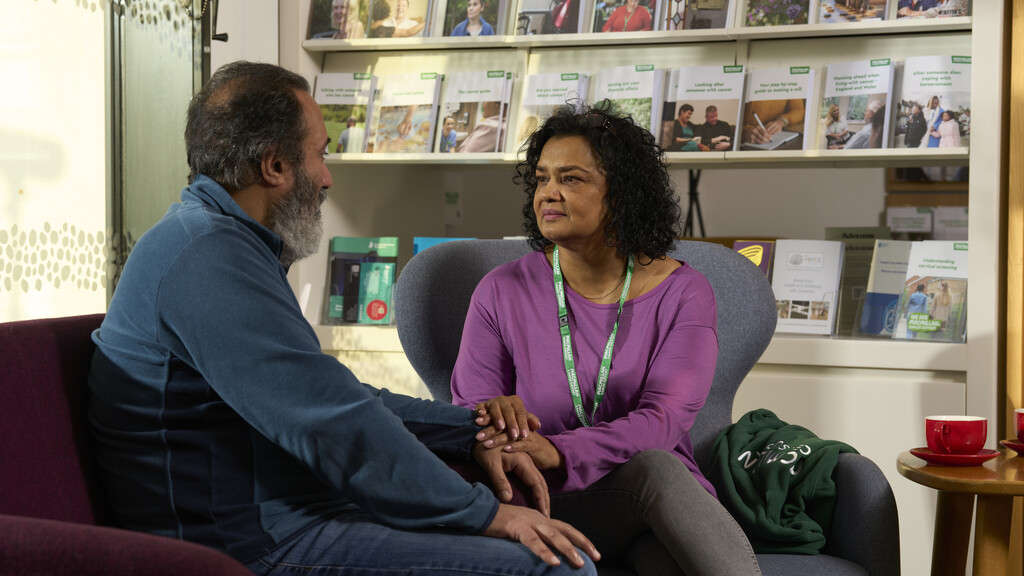Responding to NHS England January 2024’s Cancer Waiting Times Data, Minesh Patel, Head of Policy at Macmillan Cancer Support says:
‘Today’s figures show long waits for cancer treatment continue. This can’t go on. Healthcare professionals are doing all they can but are working in a permanent state of crisis. If the UK Government acts now, we can turn this around and ensure our cancer system is fit for purpose in the years to come. We need a long-term cancer strategy in England that provides the investment and focus needed so that everybody with a cancer diagnosis gets the timely and quality care they deserve.’
Naman Julka-Anderson works as a Research Radiographer and an Allied Health Professional Clinical Advisor for Macmillan Cancer Support. He says:
‘It is heartbreaking to see thousands of people continuing to wait too long for cancer tests and treatment. As healthcare staff we are doing our very best but there aren’t enough of us to keep up with the demand. We’ve had to turn patients away after they’ve waited hours for appointments, as we don’t have capacity to treat them. This isn’t something that we take lightly, and staff are leaving due to the immense pressure on their shoulders. We need to see action with a long-term cancer strategy in England, including a plan for a sustainable cancer workforce, to ensure we can provide the best possible care for people living with cancer.’
Key facts
Key Facts — January 2024 NHSE Cancer Waiting Times Data
In January 2024 there were over 75,000 people across England who waited more than four weeks to find out if they had cancer or not following an urgent referral[i]
All three of the new streamlined national targets were missed again in January and performance against the new 31-day treatment target fell to its worst level since it was introduced, showing that NHS cancer services in England are still struggling under intense pressure[ii]
Separate official NHS data shows the number of people in England with a confirmed diagnosis of cancer and decision to treat who were still waiting to start treatment more than two months after their urgent referral rose to more than 4,200 at the start of January and remained above 3,800 at the end of the month[iii]
In January 2024, there were more than 7,000 times when people with a confirmed cancer diagnosis waited more than a month to have the treatment they needed, the highest number since the new 31-day treatment target was introduced. Performance against this target was also worse than in January last year[iv]
Recent Macmillan analysis shows 2023 was the worst year on record for cancer treatment delays in England[v]
Other figures from Macmillan Cancer Support show that last year, half of people having cancer treatment in the UK (49%) were worried about general pressures on the NHS affecting their chances of survival[vi]
Over the past 10 years, the number of people with cancer waiting longer than a month to start treatment in England has increased at a rate 5 times greater than the total number of people starting treatment[vii]
References:
[i] NHS England. Cancer waiting times. CWT CRS — National Time Series Oct 2009 — Jan 2024 with Revisions. In January 2024, 75,709 people waited for more than four weeks following an urgent referral for suspected cancer to be told they either had cancer or for cancer to be definitively excluded
[ii] As per ref 1. The new combined 31-day treatment target was first introduced in December 2023, with data going back to April 2022, and the figure for January 2024 is the lowest since April 2022
[iii] NHS England. Management information on cancer.
[iv] As per ref 1. In January 2024, there were 7,022 occurrences of people with cancer waiting more than a month to have either their first or a subsequent treatment for cancer following the decision to treat/the earliest clinically appropriate date, and performance against this target was 87.5%. In January 2023, the equivalent figures were 6,253 and 88.1%
[v] Macmillan Cancer Support analysis of official statistics. Source: NHS England. Cancer waiting times. Based on a combination of analysis of from the following sources: https://www.england.nhs.uk/statistics/statistical-work-areas/cancer-waiting-times/ and https://www.england.nhs.uk/statistics/statistical-work-areas/cancer-waiting-times/#cwt-statistics-up-to-september-2023. In 2023, over 30,000 people newly diagnosed with cancer in England waited more than a month to start treatment following the clinical decision to do so, the highest annual figure since current records began in 2009. Performance against the 31-day treatment target was worse in every month of 2023 than in the same month of 2022, and overall annual performance has fallen each successive year from 2017 onwards
[vi] Macmillan Cancer Support/YouGov survey of 2,051 adults in the UK who have had a cancer diagnosis. Fieldwork was undertaken between 18th August and 31st August 2023. The survey was carried out online. The figures have been weighted and are representative of people living with cancer in the UK (aged 18+). Question wording was as follows: How worried, if at all, are you about the following? General pressures on the NHS affecting my chances of survival. Survey included 228 people currently going through cancer treatment
[vii] As per ref 5. Refers to people starting their first treatment for a new cancer diagnosis only. The monthly average for the number of people who waited more than a month to start treatment following the clinical decision to do so has increased by 7.23 times when comparing 2023 with 2013 (2,628 people per month on average compared with 364 people per month on average). In comparison, the monthly average for the total number of people starting treatment has increased between the same time periods by 1.36 times (28,371 compared with 20,877, respectively). 7.23 divided by 1.36 = 5.3
Read more
-
News and stories 19 Nov 2025Analysis from the BBC has revealed that nearly every hospital trust in England is missing key NHS cancer waiting time targets, Macmillan Cancer Support’s National Clinical Adviser, Dr Anthony Cunliff...
-
News and stories 14 May 2025The Government has announced that they are developing a new National Cancer Plan for England.
-
News and stories 10 Jul 2025The Prime Minister launched the government’s long-awaited 10 Year Health Plan, outlining a vision to “bring the NHS closer to home.”





